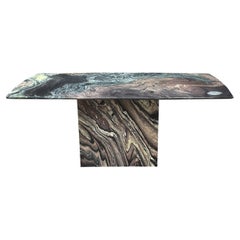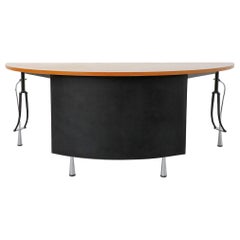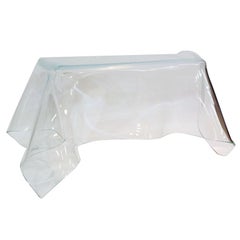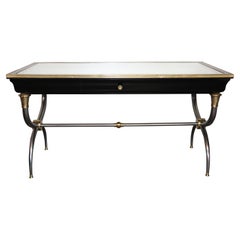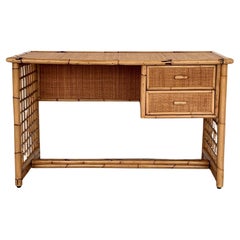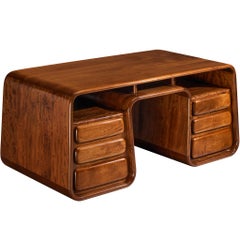Desks and Writing Tables
1990s Italian Post-Modern Desks and Writing Tables
Marble
1980s Spanish Post-Modern Vintage Desks and Writing Tables
Metal
Late 20th Century American Mid-Century Modern Desks and Writing Tables
Glass
1980s European Directoire Vintage Desks and Writing Tables
Brass, Stainless Steel
1970s Italian French Provincial Vintage Desks and Writing Tables
Bamboo, Rattan
1980s Kenyan Vintage Desks and Writing Tables
Hardwood
1970s American Mid-Century Modern Vintage Desks and Writing Tables
Chrome
1970s Dutch Mid-Century Modern Vintage Desks and Writing Tables
Pine
1970s North American Vintage Desks and Writing Tables
Maple
1970s American Mid-Century Modern Vintage Desks and Writing Tables
Walnut
Late 20th Century Italian Minimalist Desks and Writing Tables
Leather, Wood
Late 20th Century Unknown Louis XV Desks and Writing Tables
Brass
Late 20th Century Italian Post-Modern Desks and Writing Tables
Marble, Brass
Late 20th Century Czech Mid-Century Modern Desks and Writing Tables
Wood, Beech
1980s American Mid-Century Modern Vintage Desks and Writing Tables
Oak
Late 20th Century Unknown Modern Desks and Writing Tables
Glass, Acrylic, Laminate
1980s Italian Post-Modern Vintage Desks and Writing Tables
Wood
1970s Italian Modern Vintage Desks and Writing Tables
Concrete
1970s Italian Mid-Century Modern Vintage Desks and Writing Tables
Steel
1970s Danish Scandinavian Modern Vintage Desks and Writing Tables
Teak
1970s Italian Mid-Century Modern Vintage Desks and Writing Tables
Crystal, Metal
1970s Mid-Century Modern Vintage Desks and Writing Tables
Brass
1970s American Vintage Desks and Writing Tables
Fiberglass, Rosewood
1970s Italian Vintage Desks and Writing Tables
Iron
1970s American Campaign Vintage Desks and Writing Tables
Brass
1990s American Mid-Century Modern Desks and Writing Tables
Marble, Chrome
1980s Italian Campaign Vintage Desks and Writing Tables
Bamboo, Rattan
1970s Danish Scandinavian Modern Vintage Desks and Writing Tables
Oak
1970s American Mid-Century Modern Vintage Desks and Writing Tables
Oak
1970s Brazilian Space Age Vintage Desks and Writing Tables
Metal
Late 20th Century Danish Desks and Writing Tables
Aluminum
1970s American Brutalist Vintage Desks and Writing Tables
Steel
1970s American Mid-Century Modern Vintage Desks and Writing Tables
Chrome
1980s Vintage Desks and Writing Tables
Stone
1980s Mexican Modern Vintage Desks and Writing Tables
Cocobolo
Late 20th Century American Louis XVI Desks and Writing Tables
Brass
1970s Italian Post-Modern Vintage Desks and Writing Tables
Metal, Brass
1970s American Vintage Desks and Writing Tables
Wood
1980s French Mid-Century Modern Vintage Desks and Writing Tables
Elm
1970s Czech Mid-Century Modern Vintage Desks and Writing Tables
Birch, Mahogany
1990s American Hollywood Regency Desks and Writing Tables
Wood
1990s Italian Mid-Century Modern Desks and Writing Tables
Leather, Wood
Late 20th Century British Mid-Century Modern Desks and Writing Tables
Metal
1980s Italian Post-Modern Vintage Desks and Writing Tables
Granite, Copper
1970s American Mid-Century Modern Vintage Desks and Writing Tables
Walnut
Late 20th Century Louis XV Desks and Writing Tables
Bronze
1970s Italian Brutalist Vintage Desks and Writing Tables
Granite
Late 20th Century Czech Mid-Century Modern Desks and Writing Tables
Iron
1970s American Mid-Century Modern Vintage Desks and Writing Tables
Lucite, Burl
1980s Italian Vintage Desks and Writing Tables
Bamboo
1970s Italian Mid-Century Modern Vintage Desks and Writing Tables
Chrome
Late 20th Century North American Mid-Century Modern Desks and Writing Tables
Glass
1970s English Mid-Century Modern Vintage Desks and Writing Tables
Teak
Late 20th Century European Post-Modern Desks and Writing Tables
Aluminum
1970s American Brutalist Vintage Desks and Writing Tables
Glass, Resin, Hardwood
1970s Italian Mid-Century Modern Vintage Desks and Writing Tables
Steel, Chrome
Late 20th Century Desks and Writing Tables
Leather, Wood
1970s German Post-Modern Vintage Desks and Writing Tables
Plastic
Antique and Vintage Desks and Writing Tables
Choosing the perfect writing desk or writing table is a profoundly personal journey, one that people have been embarking upon for centuries.
Queen Atossa of Persia, from her writing table circa 500 B.C., is said to have been the originator of the art of handwritten letters. Hers was reportedly the first in a long and colorful history of penned correspondence that grew in popularity alongside literacy. The demand for suitable writing desks, which would serve the composer of the letters as well as ensure the comfort of the recipient naturally followed, and the design of these necessary furnishings has evolved throughout history.
Once people began to seek freedom from the outwardly ornate styles of the walnut and rosewood writing desks and drafting tables introduced in the name of Queen Victoria and King Louis XV, radical shifts occurred, such as those that materialized during the Art Nouveau period, when designers longed to produce furniture inspired by the natural world’s beauty. A prime example is the work of the famous late-19th-century Spanish architect Antoni Gaudí — his rolltop desk featured deep side drawers and was adorned with carved motifs that paid tribute to nature. Gaudí regularly combined structural precision with decorative elements, creating beautiful pieces of furniture in wood and metal.
Soon afterward, preferences for sleek, geometric, stylized forms in furniture that saw an emphasis on natural wood grains and traditional craftsmanship took hold. Today, Art Deco desks are still favored by designers who seek to infuse interiors with an air of luxury. One of the most prominent figures of the Art Deco movement was French decorator and furniture designer Émile-Jacques Ruhlmann. With his use of neoclassical motifs as well as expensive and exotic materials such as imported dark woods and inlays of precious metals for his writing desks, Ruhlmann came to symbolize good taste and modernity.
The rise in appreciation for Scandinavian modernism continues to influence the design of contemporary writing desks. It employs the “no fuss” or “less is more” approach to creating a tasteful, sophisticated space. Sweden’s master cabinetmaker Bruno Mathsson created gallery-worthy designs that are as functional as they are beautiful. Finnish architect Alvar Aalto never viewed himself as an artist, but, like Mathsson, his furniture designs reflected a fondness for organic materials and a humanistic approach. Danish designers such as Hans Wegner introduced elegant shapes and lines to mid-century desks and writing tables, often working in oak and solid teak.
From vintage desks to contemporary styles, 1stDibs offers a broad spectrum of choices for conducting all personal and business writing and reading activities.
Read More
This 19th-Century Gilded Desk Displays a Fanciful Kingdom in Marquetry
The stately piece brings both gravitas and whimsy to any work space.
Ask an Interior Designer: Work-from-Home Edition
Leaping into a design project, whether it's refreshing the bedroom or redoing the whole house, can be overwhelming. Luckily, we know more than a few interior designers. You asked questions on Instagram, and now they're answering.
18 Home Offices for Workaholic Design-Lovers
Proof that working from home is a perk.
